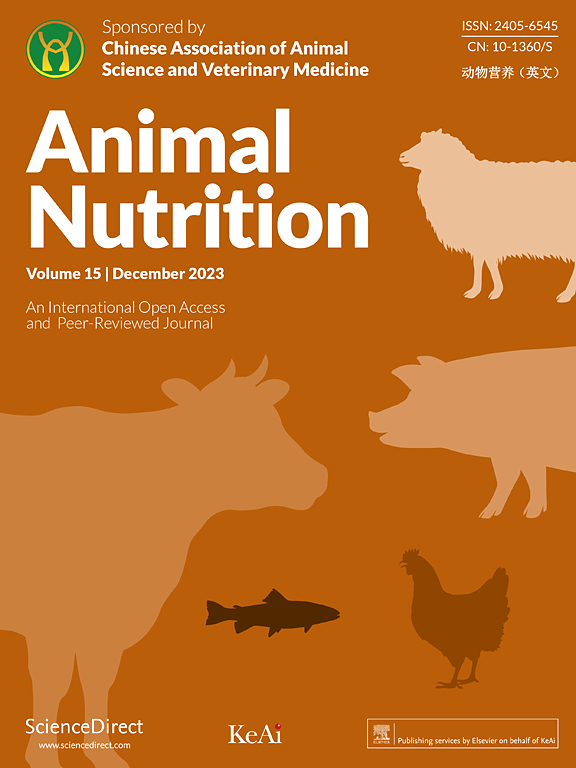Microencapsulated Lactobacillus plantarum promotes intestinal development through gut colonization of layer chicks
IF 6.1
1区 农林科学
Q1 AGRICULTURE, DAIRY & ANIMAL SCIENCE
引用次数: 0
Abstract
The effects of in microencapsulation (LPM) on intestinal development in layer chicks were investigated in this study, as well as the colonization of in the gut. A total of 480 healthy Hy-Line Brown layer chicks at 0 d old were randomly divided into 4 groups (8 replicates each treatment), and the diets of these birds were supplemented with nothing (control), (0.02 g/kg feed; 10 CFU/kg feed), LPM (1.0 g/kg feed; 10 CFU/kg feed) and wall material of LPM (WM; 0.98 g/kg feed), respectively. Compared to control, LPM improved growth performance and intestinal development of layer chicks, evidenced by significantly increased body weight, average daily gain, average daily feed intake, villus height, villus height/crypt depth, as well as weight and length of the duodenum, jejunum and ileum ( < 0.05). These results could be attributed to the increased colonization of in the gut, which was verified by significant increases in lactic acid content, viable counts in chyme and mucosa ( < 0.05), as well as a visible rise in number of strains labeled with fluorescein isothiocyanate. Meanwhile, the relative abundances of and significantly increased in response to microencapsulated supplementation ( < 0.05), accompanied by the significant up-regulation of colonization related genes ( < 0.05), encoding solute carrier family, monocarboxylate transporter, activin A receptor, succinate receptor and secretogranin II. To sum up, microencapsulated supplementation promoted intestinal development, which could be attributed to the enhancement of colonization in the intestine through the mutual assistance of and interactions with colonization related transmembrane proteins.微胶囊植物乳杆菌通过蛋鸡肠道定植促进肠道发育
本研究调查了微胶囊(LPM)对蛋鸡肠道发育以及肠道内定植的影响。将 480 只 0 日龄的健康海线褐羽蛋鸡随机分为 4 组(每组 8 个重复),分别在日粮中添加无(对照组)、(0.02 克/千克饲料;10 个 CFU/千克饲料)、LPM(1.0 克/千克饲料;10 个 CFU/千克饲料)和 LPM 壁材(WM;0.98 克/千克饲料)。与对照组相比,LPM 改善了蛋鸡的生长性能和肠道发育,表现在体重、平均日增重、平均日采食量、绒毛高度、绒毛高度/绒毛深度以及十二指肠、空肠和回肠的重量和长度均显著增加(< 0.05)。乳酸含量、食糜和粘膜中的存活菌数显著增加(< 0.05),以及用异硫氰酸荧光素标记的菌株数量明显增加,都证实了肠道中的定植率增加。与此同时,微胶囊补充剂显著增加了和的相对丰度(< 0.05),并显著上调了定殖相关基因(< 0.05),这些基因编码溶质运载家族、单羧酸盐转运体、激活素 A 受体、琥珀酸受体和分泌花生素 II。总之,微囊补充剂促进了肠道发育,这可能是由于通过与定植相关跨膜蛋白的互助和相互作用,增强了肠道中的定植。
本文章由计算机程序翻译,如有差异,请以英文原文为准。
求助全文
约1分钟内获得全文
求助全文
来源期刊

Animal Nutrition
Agricultural and Biological Sciences-Animal Science and Zoology
CiteScore
7.40
自引率
3.20%
发文量
172
审稿时长
12 weeks
期刊介绍:
Animal Nutrition encompasses the full gamut of animal nutritional sciences and reviews including, but not limited to, fundamental aspects of animal nutrition such as nutritional requirements, metabolic studies, body composition, energetics, immunology, neuroscience, microbiology, genetics and molecular and cell biology related to nutrition, and more applied aspects of animal nutrition, such as raw material evaluation, feed additives, nutritive value of novel ingredients and feed safety.
 求助内容:
求助内容: 应助结果提醒方式:
应助结果提醒方式:


